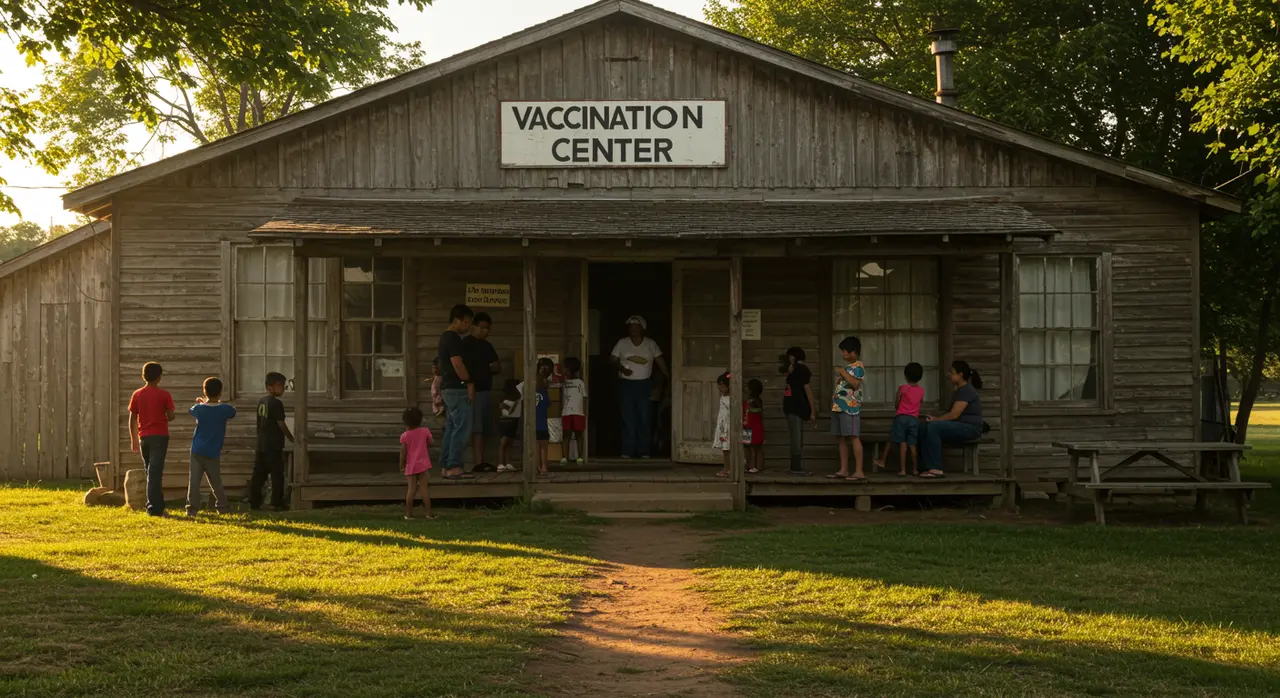Measles Outbreak in Texas Sparks Debate Amid Robert F. Kennedy Jr.s Vaccine Stance
71 views
Amid the dusty plains of Gaines County, Texas, a grim narrative unfolds as the region grapples with one of the most significant measles outbreaks in recent memory. With nearly 500 confirmed cases in Texas alone and additional infections reported in New Mexico, Oklahoma, Kansas, and across the border in Mexico, the outbreak has claimed the lives of three individuals, including two unvaccinated children. The arrival of U.S. Health and Human Services Secretary Robert F. Kennedy Jr., a figure whose name has long been synonymous with vaccine skepticism, underscores the gravity of the crisis. Kennedy’s visit, marked by a cautious acknowledgment of the efficacy of vaccination, has sparked both hope and controversy in a community desperate for answers.
A Crisis of Public Health and Trust
The outbreak, which began in late January, has exposed deep fissures in the nation’s approach to childhood immunization. Health experts have attributed the rapid spread of measles to declining vaccination rates, a trend exacerbated by misinformation campaigns that promote unverified remedies over scientifically proven methods. In Gaines County, where the outbreak has reached its devastating apex, local health officials are battling not only the virus but also the pervasive myths surrounding its prevention. One such myth involves the use of vitamin A supplements, touted by some as an alternative to vaccines. However, excessive doses of vitamin A have led to cases of liver toxicity in children, further complicating the already dire situation.

Kennedy’s visit to the region has drawn significant attention, not least because of his controversial history with vaccines. Once a prominent voice in the anti-vaccine movement, Kennedy has recently softened his stance, acknowledging in a social media post that vaccination is “the most effective way to prevent the spread of measles.” Yet, his reluctance to fully embrace widespread vaccination messaging has left many questioning whether his words will translate into meaningful action. For families mourning the loss of loved ones, the stakes could not be higher. The MMR vaccine, which has been safely administered for over 60 years and boasts a 97% efficacy rate after two doses, remains the cornerstone of measles prevention. Still, its uptake has faltered in recent years, threatening the nation’s hard-won status as a measles-free country.
The Ripple Effects of Misinformation
The outbreak’s reach extends far beyond the borders of Texas, with cases cropping up in neighboring states and Mexico. The Centers for Disease Control and Prevention (CDC) has redeployed staff to assist in containment efforts, emphasizing the urgency of immunization campaigns. Yet, misinformation continues to undermine these efforts, sowing confusion and fear among parents already hesitant to vaccinate their children. Social media platforms, often the breeding grounds for such misinformation, have amplified unverified claims about vaccine risks and alternative treatments. This deluge of false information has left many families grappling with difficult choices, torn between scientific evidence and the persuasive narratives of anti-vaccine advocates.
The consequences of declining vaccination rates are stark. According to health officials, the majority of cases in this outbreak involve unvaccinated individuals, particularly children under the age of 17. Experts warn that the outbreak could persist for several months or even a year, straining healthcare systems and placing vulnerable populations at increased risk. The specter of losing the nation’s measles elimination status, achieved in 2000, looms large, serving as a sobering reminder of the fragile balance between public health achievements and the forces that threaten to unravel them.
Kennedy’s visit has brought renewed focus to these issues, but his measured rhetoric has left some questioning his commitment to reversing the tide of vaccine hesitancy. While his acknowledgment of vaccination’s efficacy represents a significant shift, critics argue that his previous advocacy against vaccines has contributed to the very crisis he now seeks to address. For many, his words ring hollow without a robust plan to counteract the misinformation that has taken root in communities like Gaines County.
A Path Forward: Rebuilding Confidence and Community
As the outbreak continues to unfold, the path forward will require more than just medical intervention; it will demand a concerted effort to rebuild trust in vaccines and the institutions that promote them. Local health officials have emphasized the importance of community engagement, urging parents to consult trusted healthcare providers and seek accurate information about the benefits and risks of vaccination. Public health campaigns must also adapt to the realities of the digital age, countering misinformation with compelling, evidence-based narratives that resonate with diverse audiences.
The stakes are high, not only for the families affected by this outbreak but for the nation as a whole. The measles virus, highly contagious and potentially deadly, poses a threat that transcends state and national borders. Its resurgence serves as a stark reminder of the consequences of complacency in public health. For communities like Gaines County, the lessons of this crisis are both painful and profound: the cost of misinformation is measured not only in lives lost but in the erosion of trust that takes years to rebuild.
In the wake of Kennedy’s visit, the question remains: will his acknowledgment of vaccination’s importance translate into meaningful action, or will his legacy as an anti-vaccine advocate overshadow his efforts to stem the tide of this outbreak? As health officials and community leaders grapple with these challenges, one thing is clear: the fight against measles is not just a battle against a virus but a struggle to reclaim the trust and confidence that underpin effective public health initiatives. For Gaines County and the nation, the road ahead is uncertain, but the urgency of the moment demands both resolve and reflection.